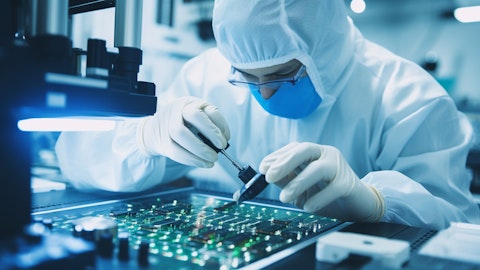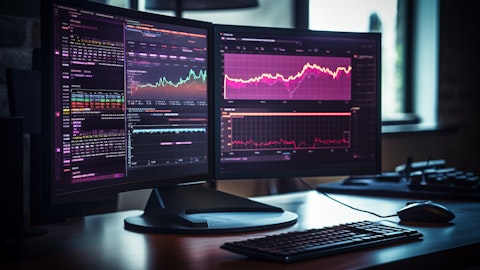We recently published a list of 7 Worst Vertical Farming and Hydroponic Stocks to Buy. In this article, we are going to take a look at where Agrify Corporation (NASDAQ:AGFY) stands against other worst vertical farming and hydroponic stocks to buy.
Vertical farming and hydroponics have proven to be revolutionary solutions in the agriculture sector, addressing food security, sustainability, and urbanization challenges. The global hydroponics market is expected to grow to $25.1 billion by 2027 from $12.1 billion in 2022, as per MarketsandMarkets. On the other hand, the vertical farming industry is forecasted to grow to $50.1 billion by 2032 from $6.92 billion in 2024, according to Fortune Business Insights. Hence, the sector has strong growth potential.
However, despite such positive forecasts, not all companies in the sector are poised for success. Several players are facing a downfall due to rising operational costs, scalability-related issues, and financial instability. These factors make some of the stocks in the sector riskier than others. One of the main factors affecting the industry is the high cost of setting up and maintaining vertical farms. High capital investment is required to support innovations like LED lighting, AI-driven automation, and climate-controlled systems. Although innovations like the CoolGrow VF LED light have enhanced energy efficiency by up to 38%, overall operational costs remain high. Moreover, farm input costs have climbed 44% since 2019, according to AHDB, with fertilizer, electricity, and machinery costs surging between 38% and 50%, decreasing profit margins. Such rising costs put pressure on companies to maintain profitability, especially where the industry struggles with tight margins.
Similarly, dependence on artificial lighting and climate control results in high energy consumption, increasing costs, and reducing profitability. Although technological advancements are being made to decrease costs, energy-intensive operations hit profit margins. Additionally, supply chain disruptions, especially after the COVID-19 pandemic, have added further complications. Labor-related shortages and transportation issues have put pressure on companies, making it difficult to scale operations efficiently. Many vertical farms rely on highly specialized components, and delays in sourcing critical equipment halt expansion efforts.
Furthermore, the hydroponics sector has also been facing regulatory uncertainty. Although cannabis legalization in several markets initially increased demand for hydroponic systems, inconsistent regulations and oversupply in the cannabis market have stunted growth. Many companies in the sector that heavily rely on cannabis cultivation have faced difficulties in pivoting to other revenue streams. On the other hand, although demand for vertical farming produce is increasing, it faces challenges due to higher price points compared to traditional agriculture. While sustainability is an attractive selling point, budget-sensitive consumers tend to go for cheaper options, resulting in a decrease in the market reach of vertically farmed produce.
Investor sentiment is shifting, with increasing doubts regarding capital-intensive agritech ventures. According to McKinsey & Company, annual investments worldwide in food and agribusiness have surpassed the $100 billion mark. However, hydroponic and vertical farming companies are still finding it difficult to secure funding. This has resulted in increased short interest in several underperforming stocks, with hedge funds betting against companies that do not demonstrate sustainable long-term business models. Companies that previously ensured high-margin growth have faced a decrease in revenue, adding to concerns regarding long-term viability.
Ultimately, the structural challenges of the industry, as well as economic pressures, have led to significant stock underperformance for multiple vertical farming and hydroponic companies.
Methodology
To come up with our list of the 7 Worst Vertical Farming and Hydroponic Stocks to Buy, we started by making use of Finviz screener to identify stocks from the agricultural inputs and farm products industries. We also looked into our previous articles on the sector to make sure relevant companies with substantial market capitalization are included.
Next, we looked into hedge fund interest in these companies, as we believe that stocks with significant institutional backing point toward financial stability. However, we focused on short interest, measured by the short percentage of float, reflecting investor skepticism and potential risks. A higher short interest points toward a company’s frail financial position, operational inefficiencies, or larger industry challenges. The companies were then ranked in ascending order based on their short percentage of float, with the most shorted stocks situated at the top of our list.
Why are we interested in the stocks that hedge funds pile into? The reason is simple: our research has shown that we can outperform the market by imitating the top stock picks of the best hedge funds. Our quarterly newsletter’s strategy selects 14 small-cap and large-cap stocks every quarter and has returned 373.4% since May 2014, beating its benchmark by 218 percentage points (see more details here).

A technician overseeing a pesticide-free surface protection product application in a construction site.
Agrify Corporation (NASDAQ:AGFY)
Short % of Float: 2.26%
Number of Hedge Fund Holders: N/A
Agrify Corporation (NASDAQ:AGFY) provides software and hardware solutions for the cannabis and hemp industries, offering vertical farming units, cultivation software, and LED grow lights. The company also provides engineers, consulting, and construction services along with alcohol, hydrocarbon, and solventless extraction equipment. Agrify plans to optimize indoor farming and extraction processes by using technology-driven innovations, serving both large-scale and independent operators.
Agrify Corporation (NASDAQ:AGFY) reported a revenue of $1.9 million and a gross profit of $0.2 million for the third quarter that ended September 30, 2024. However, primarily due to a $15 million change in the fair value of warrant liabilities, the company recorded a net loss of $18.6 million. It secured $20 million in convertible note financing to solidify its financial position, with an initial $10 million draw from Green Thumb Industries in early November.
Moreover, Agrify Corporation (NASDAQ:AGFY) has announced leadership transitions, with Ben Kovler taking on the Chairman and Interim CEO positions. Its recent non-binding letter of intent to acquire the Señorita brand of hemp-derived THC beverages demonstrates its shift in focus toward consumer-oriented products. This move reflects the company’s effort to diversify its business, yet the cannabis and hemp sectors remain highly competitive, with regulatory and economic hurdles impacting profitability.
However, the company faces challenging market conditions, with a year-to-date share price reduction of over 45%. Agrify Corporation (NASDAQ:AGFY) ranks among the worst agriculture stocks due to the ongoing financial challenges and shifting business strategies, as uncertainties around profitability and execution risks remain a concern for investors.
Overall, AGFY ranks 5th on our list of worst vertical farming and hydroponic stocks to buy. While we acknowledge the potential of AGFY, our conviction lies in the belief that AI stocks hold greater promise for delivering higher returns, and doing so within a shorter timeframe. There is an AI stock that went up since the beginning of 2025, while popular AI stocks lost around 25%. If you are looking for an AI stock that is more promising than AGFY but that trades at less than 5 times its earnings, check out our report about this cheapest AI stock.
READ NEXT: 20 Best AI Stocks To Buy Now and 30 Best Stocks to Buy Now According to Billionaires.
Disclosure: None. This article is originally published at Insider Monkey.





